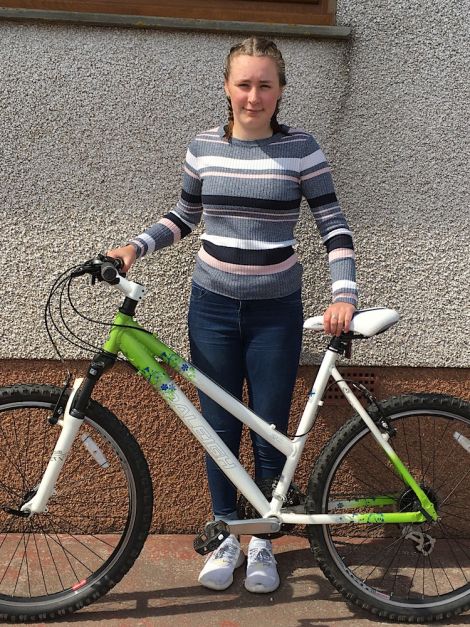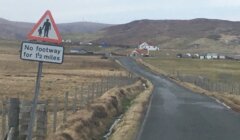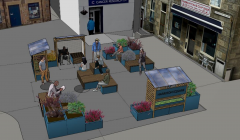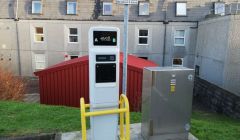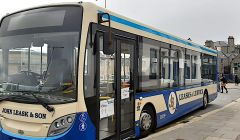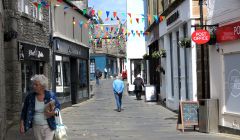ZetTrans / Talking about transport
It is more important than ever that people ensure their views are heard because transport is undergoing a transformation, writes ZetTrans policy and project officer Robina Barton.
PUBLIC consultation on Shetland’s draft Active Travel Strategy began earlier this month. It will soon be followed by further calls for public involvement, with a review of public transport fare policy underway and a new Regional Transport Strategy in development.
Climate change, societal inequalities and poor public health are driving the need for us to reduce energy consumption, improve access to opportunity and increase physical activity within our communities.
Strategic direction is increasingly moving away from private car use towards more sustainable and inclusive transport modes. Electric and hydrogen powered vehicles are just part of the picture.
Flexible and demand responsive transport solutions are creating opportunities for personalised travel provision for users and increasing efficiency of formerly fixed route services.
Other approaches to mobility enable car sharing between members of a neighbourhood, and public use of local authority fleet vehicles out of hours – thus maximising benefit from assets that would otherwise sit idle.
Such developments have significant potential in rural locations, traditionally underserved by public transport. Reducing the need for car ownership is a big step towards levelling the playing field of access to jobs, goods and services.
Existing owners can’t miss the financial upside of flexible ‘pay as you go’ transport over a possession that sits idle for an average 97 per cent of the time and requires regular maintenance.
And what of active travel? Physical activity is good for both physical and mental health, is low or no cost and reduces our reliance on the finite resources of the planet.
The Shetland weather can be inclement, but it is seldom that cycling or wheeling is not an option and even more rare that walking is out of the question, as long as clothing is wind and waterproof. This does not require major investment – even high-end outdoor clothing is considerably cheaper than a budget car!
Active travel is as much a social experience as a physical one. It is about transforming towns and neighbourhoods into places where people want to spend time together, ensuring that our society is genuinely inclusive.
Improving space and facilities for walkers and cyclists makes life easier for parents pushing prams and people with mobility aids, whilst retail spend has been shown to increase in places where walkers and wheelers are given priority over motorists.
Alongside the availability of different modes of travel, new technology that allows you to plan, book and pay for multi-modal journeys is helping sustainable travel choices to become the easiest and therefore obvious choice for daily journeys all over the globe.
The dominance of the private car within transport networks is definitely on the wane.
Unease with change is natural, but change is undoubtedly coming, and communities are increasingly encouraged to help shape it. The 2015 Community Empowerment Act, states that “Scottish public authorities must promote and facilitate the participation of members of the public in the decisions and activities of the authority”.
Unfortunately, this can be a rather one-sided exercise, since although the public is invited to participate, there is no obligation to do so. Ensuring meaningful levels of involvement is a difficult nut to crack and things can end up weighted towards people who feel strongly enough and are confident enough to speak up.
There are many reasons why people don’t participate – lack of faith in the process, lack of awareness or lack of interest but it is often said that history is made by those who show up.
When defining the public bus network for the implementation of new service contracts in 2019, ZetTrans [the Shetland Transport Partnership] held 16 public events across Shetland which were advertised in all bus stops and in the local press. Free transport to the events was laid on for all those requiring it.
Much useful information was gleaned from the events and changes were implemented (increasing the service 6, reconfiguring the town service and making slight adjustments to other services) as a result. This summer, transport staff implemented 166 new public and school transport service contracts under the challenges of home working and uncertainty over schools reopening.
Perhaps we need to acknowledge that responsibility, and indeed the opportunity, to shape development rests with all who care about our future. Navigating a way between public events, targeted engagement and multiple digital platforms for interaction has always been tricky. With public events and face-to-face meetings out of the question during the pandemic the challenge to ensure widespread participation just got even bigger.
Now more than ever, public bodies need help to ensure that they capture and respond to the diverse needs of the communities they exist to serve. All Shetland residents are urged to take part in public consultations, tell others about them, and suggest ways that these processes can be made more inclusive.
Consultation on Shetland’s Draft Active Travel Strategy is open until Friday 11 December. The consultation on Public Transport Fares will take place from today, 30 November, to 20 December. Both can be found at www.zettrans.org.uk/about/consultations
Become a member of Shetland News
Shetland News is asking its readers to consider paying for membership to get additional perks:
- Removal of third-party ads;
- Bookmark posts to read later;
- Exclusive curated weekly newsletter;
- Hide membership messages;
- Comments open for discussion.
If you appreciate what we do and feel strongly about impartial local journalism, then please become a member of Shetland News by either making a single payment, or setting up a monthly, quarterly or yearly subscription.



